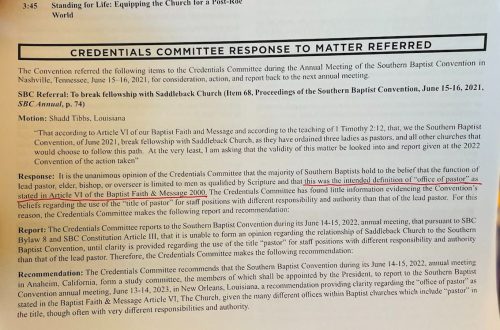 David Gushee has written a column for Religion News Service arguing that the “middleground” is disappearing on LGBT rights. He writes:
David Gushee has written a column for Religion News Service arguing that the “middleground” is disappearing on LGBT rights. He writes:
Middle ground is disappearing on the question of whether LGBT persons should be treated as full equals, without any discrimination in society — and on the related question of whether religious institutions should be allowed to continue discriminating due to their doctrinal beliefs.
It turns out that you are either for full and unequivocal social and legal equality for LGBT people, or you are against it, and your answer will at some point be revealed. This is true both for individuals and for institutions.
Neutrality is not an option. Neither is polite half-acceptance. Nor is avoiding the subject. Hide as you might, the issue will come and find you.
Gushee is no doubt right about this. Those pushing for LGBT “rights” do not mean to offer any accommodation whatsoever to those of us who dissent from the moral revolution overtaking the West. All dissent must be eliminated, and those who continue to defy the revolution must be marginalized as morally retrograde bigots. There will be no hiding. No compromises. Everyone will eventually be smoked-out. And those who resist will be crushed. That is their aim.
Gushee argues that this moral revolution represents “progress.” He also agrees with the sexual revolutionaries that traditional Christians are guilty of invidious discrimination. The implication seems to be that Christians deserve what they have coming to them.
Over against this sweeping trend in favor of full LGBT equality and nondiscrimination stands America’s most conservative religious communities and their leaders, together with localities and states most affected by such conservative religiosity, and a weakening but still powerful contingent of activists, lobbyists, and Republican Party stalwarts.
I have been a participant in the effort to encourage Protestant religious conservatives, generally known as fundamentalists and evangelicals, to reconsider their position voluntarily. The same conversation is happening in almost every US religious community.
Notice that Gushee says that he is trying to convince evangelical Christians to change their views “voluntarily.” Don’t miss the significance of that. Gushee knows that those who resist the revolution will eventually run out of chances to cooperate. He knows that we will face coercive measures from the government and from private interests to force Christians to accept what their faith forbids. If we won’t submit “voluntarily” we will be forced to do so “involuntarily.”
Gushee describes in detail the coercive measures coming toward Christians.
Openly discriminatory religious schools and parachurch organizations will feel the pinch first. Any entity that requires government accreditation or touches government dollars will be in the immediate line of fire. Some organizations will face the choice either to abandon discriminatory policies or risk potential closure. Others will simply face increasing social marginalization.
A vast host of neutralist, avoidist, or de facto discriminatory institutions and individuals will also find that they can no longer finesse the LGBT issue. Space for neutrality or “mild” discrimination will close up as well.
And then Gushee closes with this:
“Sometimes society changes and it marks decadence. Other times society changes and it marks progress. Those who believe LGBT equality marks decadence are being left behind.”
Gushee seems to know that conflict is upon us. He seems to agree that it must happen because Christians are wrong to oppose the moral revolution.
More than anything, Gushee’s column fills me with grief. There couldn’t be a bigger gap between what he would like to happen and what is actually happening among Christians right now. He would like for us to give up on the faith once for all delivered to the saints (Jude 3). But we aren’t going to do that. We believe that Jesus alone has the words of eternal life, and we aren’t going to trade his word for a mess of revolutionary pottage (John 6:68). We believe it is worth it to follow him no matter the cost.
We are not looking for ways to escape suffering by placating the spirit of the age. We are preparing ourselves to embrace suffering so that we can follow Christ. Christ told us it would be this way for his disciples, so we are trying to get ready for what he told us to expect (Matt. 16:24-26).
We also know that the conflicts ahead will be a proving ground for the faithful. There are many who call themselves Christian now but who will fall away when the conflicts come. When it becomes costly to follow what Jesus says about sexual immorality, some people will deny Jesus’ word in order to avoid the conflict. And that denial will not lead them to Jesus but away from Jesus. The settled conviction to deny Christ’s word is what the Bible calls apostasy (1 Tim. 4:1). Their going out from us to join the opposition will show what they are:
“They went out from us, but they were not really of us; for if they had been of us, they would have remained with us; but they went out, in order that it might be shown that they all are not of us.” -1 John 2:19
We are preparing ourselves for the heartbreak of these departures. But as they go out, the faithful are going to count the cost of staying in. That is what we are doing right now. And we are praying for the strength and resolve to stand when the heat is on. It is not even on our radar screen to consider turning back, as Gushee would have us to do. We are on the narrow way with Jesus, and by the grace of God there will be no going back.
At my church, my fellow pastors and I are trying to prepare our congregation for the days ahead. Just last week, I preached on Paul’s sober words to Timothy about suffering for the faith. I conclude with the words of that text and what I said about them.
“Indeed, all who desire to live a godly life in Christ Jesus will be persecuted.” -2 Timothy 3:12
Persecution and suffering are not the exclusive preserve of the pastor. They are the lot of anyone who desires to follow Christ. It is the lot of every Christian. That is why Jesus himself told us:
Luke 14:27 “Whoever does not bear his own cross and come after me cannot be my disciple.”
You can’t even be a real Christian if you are not willing to follow Jesus into suffering—even the suffering that leads to death. And here Paul is saying that “all who desire to live godly in Christ Jesus will be persecuted.” Think about that. Not “some” but “all.”
Some people hear that word from Paul and object, “Really? All? I know lots of Christians who aren’t persecuted. Does that mean they’re not Christians?” There are no exceptions to “all,” but that doesn’t necessarily mean that they aren’t Christians. If they are really Christians, it means one of two things:
(1) They haven’t experienced persecution yet, and their time is coming.
(2) They have misunderstood what the Bible means by “persecution.” We tend to think of “persecution” solely as intense forms of suffering for the faith. But the Bible is broader than that.
Matt. 5:10-12
10 “Blessed are those who are persecuted for righteousness’ sake, for theirs is the kingdom of heaven. 11 Blessed are you when others revile you and persecute you and utter all kinds of evil against you falsely on my account. 12 Rejoice and be glad, for your reward is great in heaven, for so they persecuted the prophets who were before you.”
Notice that “reviling” and “saying evil things” fits under the category called “persecution.” That means that persecution doesn’t always mean extreme cases of physical suffering that could lead to death. It means any form of mistreatment for the sake of the gospel, and that mistreatment could range anywhere from “saying evil things” to being put in prison to losing all of your possessions or even to physical suffering and loss of life.
Let’s be honest. In America, our “persecution” has been on the easy end of the persecution spectrum. What we go through in terms of mistreatment can hardly be compared to brothers and sisters around the world who are losing their families and their very lives for the gospel (Heb. 12:4). Nevertheless, as long as we live in this world, all of us Christians will find ourselves somewhere on the persecution spectrum. But even if our experience has not to been as intense as other Christians, but we shouldn’t lose sight of the fact that our situation is changing.
In the last several years, we have seen situations of persecution elevate even here in America—much of it in connection with what we believe the Bible teaches about sexual morality. Have you heard of the Storman family in Washington State, who own a pharmacy but who have refused to sell drugs that cause abortions (source)? The State of Washington ordered the Stormans to sell the drugs or face the consequences. This family believes that killing unborn children is wrong, and so they sued the state for relief.
In 2012, a federal court ruled that the law violated the free exercise clause of the first amendment and that the law was “riddled with exemptions for secular conduct, but contain no such exemptions for identical religiously-motivated conduct.”
In 2015, however, a federal appeals court overruled and said that the pharmacists and family must violate their consciences in order to do business in Washington State. The family and the pharmacists appealed their case to the Supreme Court.
In June, the Supreme Court denied to hear their appeal. It means that the lower court ruling stands and that they cannot do business in Washington State unless they are willing to violate their religious beliefs.
Justice Samuel Alito wrote a dissent against the Supreme Court’s decision, and he was joined by Chief Justice John Roberts and Justice Clarence Thomas. You need to read this excerpt from the dissent:
“This case is an ominous sign… If this is a sign of how religious liberty claims will be treated in the years ahead, those who value religious freedom have cause for great concern.” [underline mine]
What America has been is not what it will be either for you or for your children. Are you preparing yourself and your children to be faithful when it all comes down? Are you going to be faithful to Christ when they tell you that following Christ means giving up your livelihood? There are already American Christians who are facing that choice right now.
If you think that you and I are exempt from this kind of persecution, you are wrong. We have no guarantee that we will not face the same difficulty in the near or long term. We might. And the question that we have to ask ourselves is this. Will we be ready when our time comes? If we are unwilling to suffer at the easy end of the persecution spectrum, we won’t be ready when the persecution begins moving toward the more difficult end of the spectrum. We need to be ready, and we need to be preparing our kids to be ready. And the first step to being ready is to remember, “All who desire to live a godly life in Christ Jesus will be persecuted.” This is the norm, not the exception.



